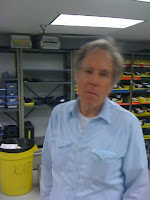Seeing as how it was my last day I was less than enthused to go. I have loved the work I do there, and especially loved the experience earned. It was a slow day. Joe told me they normally get all kinds of crazy calls on Fridays. They get calls from people who have no clue what they want. People just walk into the studios say "I have a movie I wanna shoot." and then ask for a camera. Joe still has to entertain these bizarre people, but they know these guys won't be able to pay. It's a kind of rat race for the camera department.
 |
| Camera Rig: Step 1: The Head |
 |
| Step 2: Camera Body |
 |
| Step 3: Rods |
When Ryan offered to take some equipment to the Panavision studios I jumped at the chance to go with. We hopped in his car and took off. The ride was 15 minutes long, and we listened to Punk rock all the way there. What started as a conversation about punk rock and music in general turned to a discussion with Ryan about his history. Suffice to say I don't think it's appropriate for me to share that information over the internet. I respect his privacy. But he was very interesting to hear from. He was a punk rocker in high school. He played in some bands. He studied music at UNT for awhile before getting involved. I certainly learned a lot from hearing his story. AND! For the record: He may have been very immature in high school, but he's certainly matured. I'd vouch for Ryan so no worries. I just got some good life lessons from him on our car ride to Panavision.
 |
| Step 4: Lens + Accessories |
The Panavision rental house was larger than MPS. They're an international company so that doesn't surprise me.The people over there were nice too. Everyone who works at camera rental houses seem to be pretty nice people. I found it very funny that Panavision has it's own kind of gift shop. It's interesting to note that there's such a large subculture of camera operators, owners, technicians, and assistants that camera rental houses have their own gift shops.
 |
| MPS' secret weapon: Mike |
The day was pretty much like that. We set up another rig with the Arri Alexa Plus. I got to mount the head, the camera body, even the rods, and I attached the lens with the motors. I did the whole rig! Not by myself, but given enough time I could've figured it out. I even solved a couple problems while Ryan was working something else. It was my pride and joy of the day.
In review I learned way too much to write down. As it stands this blog post is incredibly long. Lemme give some bullet points to sum it all up.
 |
| The finished product. What I did today. |
- I learned a ton of technical camera terminology and mechanics that I will not learn in college.
- I learned about what film school teaches its students. The basics since nobody knows anything.
- I learned the best opportunity for valuable experience is on shoots.
- I learned about the kinds of people I will meet in this future-world of cameras, lights, and action.
This senior project has been very valuable to me for all the experience. I hope to do the experience justice when I give my formal presentation. We shall see though.
For anyone out there reading this: This is the end of this blog.
Peace out Cosmic conciousness.
Daniel Pappas







